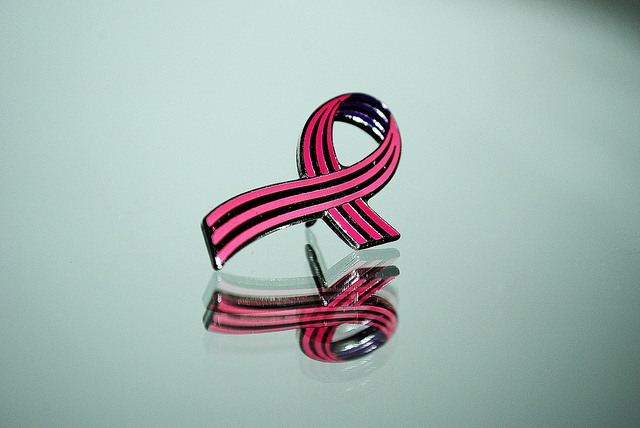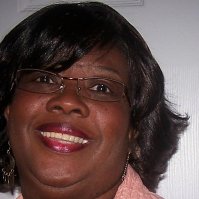According to the >>National Cancer Institute , 127 out of 100,000 North Carolina women develop or die from breast cancer each year. That’s higher than the national average. In some counties, like Halifax and Northampton, mortality rates of breast cancer among women are even higher than the state average. For some demographics of women, like African-American women, these numbers are even >>higher . So women’s health educators, like Patricia Peele, are really important.
“People tell me that any time anybody mentions breast cancer that they think about me and that I’m the go-to person,” she says. She educates women in Halifax and Northampton counties about breast cancer prevention, symptoms, and treatment. Peele explains that the raw information surrounding breast cancer can be overwhelming for many busy women who don’t have time to comb through medical journals and websites. Luckily, Peele’s good at doing just that.
“Researchers may be able to research the information and put out the data, but it takes translation sometimes for people to understand what that means and how to use that information to your benefit. So educators are important. And I think I have a damn important job, and I take it very seriously. Because lives are at stake. It’s a matter of life and death.”
Peele’s work in women’s health advocacy and education began almost as an accident. After years of working in the North Carolina Cooperative Extension Service, a friend recommended Peele for a job at the Rural Health Group. “I knew nothing about breast cancer. I knew nothing about healthcare,” Peele recalls.
“When I got to the Rural Health Group and began working, I had to get books and study and read. My job was a part of this grant to educate women about breast cancer and help create awareness in the community… As I was reading, I became very passionate about it, and all of a sudden I realized, ‘Oh! This is me. This is really what I want to do.”
Peele’s passion has fueled all kinds of efforts to advance women’s health in rural Eastern North Carolina, which she calls “one of the most deprived areas in the state” for breast cancer resources. And advance women’s health she has. Peele’s work ranges from educational programs informing women about the importance of early to serving on boards and commissions as an advocate for women’s health concerns. Through the Rural Health Group, she has used her creativity to formulate programs, presentations, and workshops full of information about breast cancer, and when she personally cannot reach communities who need the knowledge she has to give, Peele trains lay health advisors to go out into the community and do so themselves.
Not only does Peele work as an educator and advocate, but Peele directly serves women who are fighting breast cancer in the community. She says it’s important to help them navigate medical systems. When women are diagnosed, there are a lot of choices they have to make about their care.
“It used to be for people who were sick with anything they went to the hospital. Now, they got cancer centers, cancer hospitals, cancer doctors, cancer this and that, it’s specialized to the extent that people really don’t know and can’t hardly identify with what they need to do, where they need to go, who they need to see.”
Peele wants women to feel comfortable and confident in their choices and their surroundings. She hopes to prepare them for any situations they might face while in the hospital. So Peele’s organizations sponsor tours of UNC Hospitals and educate women on how to access care and navigate medical systems. “We want to empower our patients so that when they go [to the hospital or doctor’s office], they go expecting, and not begging. It makes a difference.” Peele also organizes local support groups for women who want to connect with other patients and helps area women raise money to offset the expenses of cancer treatment for patients.
Peele’s hard work hardly goes unnoticed. In 2015, she was nominated for the Roanoke Valley Community Champion Award and was honored in Roanoke Valley Woman Magazine, which ran an edition entirely dedicated to Peele’s work and the issue of breast cancer in the area. Even in this honor, Peele’s mind was still buzzing on how best to educate the community about breast cancer. “They had wanted to focus on me, but I’m not that kind of person.” Instead, Peele suggested they focus on her work. “My whole idea was to try to create awareness.”
For Peele, raising awareness extends even beyond her local community. She wants the whole state to know that in Halifax and Northampton Counties, breast cancer is a problem. That’s why she and Audrey Hardy created the Roanoke Valley Breast Cancer Coalition, a non-profit organization that pulled together health care workers to create what she calls a “pink print”—a pink Tar Heel symbol—positioned right over Halifax County and Northampton County on North Carolina maps.
“That symbolizes calling attention to the needs here in our county because our incident rates are higher than the state rates, our mortality rates are higher, and so we have some serious needs,” Peele explains. It’s a sign to welcome in outside efforts to help her community in the fight against breast cancer.
Peele is truly a force. Kind and passionate, she stops at nothing to help others in the fight against breast cancer. She is certainly a woman to celebrate.
For more information about the signs and symptoms of breast cancer, >>follow this link .


Betty B. Randolph has read and know how important Pat’s work is, she is a go getter and it is not over until it is over.
I am very proud of you and the work you are doing.